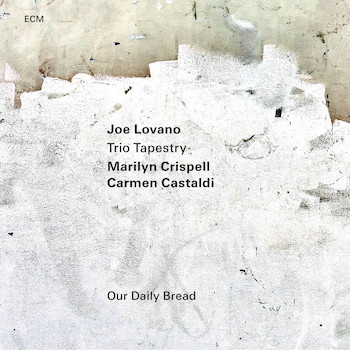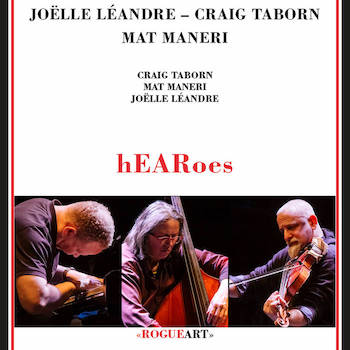Jazz Album Reviews: Two Trios That Venture Far and Away
By Steve Feeney
Two new releases, led respectively by a saxophonist and a bassist, add to the growing mystique of trios in contemporary jazz.
Joe Lovano, Marilyn Crispell, Carmen Castaldi — Trio Tapestry — Our Daily Bread (ECM)
Joëlle Léandre, Craig Taborn, Mat Maneri — hEARoes (Rogueart)
 Two new releases, led respectively by a saxophonist and a bassist, add to the mystique of trios in contemporary jazz.
Two new releases, led respectively by a saxophonist and a bassist, add to the mystique of trios in contemporary jazz.
Saxophonist Joe Lovano has been around a long time. He has always been a bit of an old soul in his approach — a big sax man, but for our time. He’s still working things out, though. That’s a good thing.
I first heard the Cleveland native in the ’80s and ’90s in recordings of groups led by Paul Motian and John Scofield, as well as on a big bunch of his own releases on Blue Note. I’ve also heard him live a few times in large and small group contexts.
Among several recent projects, Lovano (tenor sax, tarogato, gongs) has been fronting a threesome with Marilyn Crispell (piano) and Carmen Castaldi (drums, gongs, temple bells) called Trio Tapestry for the ECM label. Their third release is Our Daily Bread and it features all Lovano compositions.
It is advisable to gear-down your sonic expectations for the slow developing music on this disc, but the quality of the performances, particularly the group’s collective interactions, consistently remain high.
Two pieces that loosely recall the work of John Coltrane supply invitations for meditative immersion. Both “Grace Notes” and the album’s title cut proffer that sort of slow modal build, including effusions of lyricism à la the master. Lovano employs his soprano-ish Tarogato horn on “Grace Notes,” generating tension that is eventually released in a percussion coda from Castaldi. In “Our Daily Bread” the leader is on tenor: he supplies a reverie that is capped by a shimmering solo from Crispell. Each tune takes you on a journey to a thoughtful, spacious sort of bliss by a slightly different route.
Dedicated to the late, great bassist Charlie Haden, with whom Lovano worked at length, “One for Charlie” features a brief tenor sax solo that evokes the succinct but deeply profound work of a musician we all miss.
The duet “Le Petit Opportun” suggests Wayne Shorter performing with Herbie Hancock circa 1967. It’s a gently sweet reminder of Lovano’s dedication to bringing the sources and methods of modern jazz classicism into the future.
Lovano’s boppish swagger peeks through — just a touch — on “Rhythm Spirit,” a piece that finds him in duet with Castaldi’s percussive subtleties (the latter remind me of the work of another of Lovano’s musical celebrated cohorts, drummer Andrew Cyrille).
Examples of pensive, late-night reflection bookend the disc. “All Twelve” and “Crystal Ball” hover around conventional chamber sonorities, but on occasion manage to gently push beyond.
 Pushing a little harder against the borders of the familiar is a rambunctious trio led by 70-something avant-garde bassist Joëlle Léandre. Released by Rogueart, the recording, entitled hEARoes, was recorded live at a French festival in February, 2022.
Pushing a little harder against the borders of the familiar is a rambunctious trio led by 70-something avant-garde bassist Joëlle Léandre. Released by Rogueart, the recording, entitled hEARoes, was recorded live at a French festival in February, 2022.
The threesome, featuring Craig Taborn (piano) and Mat Maneri (viola), is about letting things get more or less a bit crazy via some collective improvisation, stirred-up and atonal. The disc’s seven sections, denoting the letters of the album’s title, were composed by all three of the musicians. The result is just under 40 minutes of edgy fascination by the essentially coequal ensemble.
“h” sets the restless standard, featuring pulses of arco from the strings and spacious tinklings from Taborn. “E” has Léandre walking an uneven line while Taborn scrambles and unscrambles a phrase that wants to be blue. Maneri double stops a stretchy statement.
“A” is a piano exercise interrupted by the strong bow of Léandre. “R” is where the ear-whipping fun really begins. Bent bass notes entice Maneri into becoming a violist trapped in what could be called a dancing quandary. Taborn settles things temporarily before the strings scrape and scream into a Jurassic breakout of worry and wonder.
“o” gives Taborn a lengthy solo intro before Maneri comes in with some mournful ruminations. Temperatures rise with the arrival of an expressive outburst before the lights dim and we’re into “e.” Son of Joe Maneri, the microtonal sax and clarinet master, the violist sets about poking and pushing the cracks in the sound world in an extended solo before Léandre joins in a three-way jumble of prickly piano and all-out low rumble.
“s” finishes the disc with a final venture into the far, far reaches of the space-time continuum. The three circle over, under, and around each other in search of the elusive source point of collective improvisation. Or, so it seems.
This is rarefied stuff. But anyone with an ear for the abstract should get it.
Steve Feeney is a Maine native and attended schools in Maine, New Hampshire, and Massachusetts. He has a Master of Arts degree in American and New England Studies from the University of Southern Maine. He began reviewing music on a freelance basis for the Portland Press Herald/Maine Sunday Telegram in 1995. He was later asked to also review theater and dance. Recently, he has added BroadwayWorld.com as an outlet and is pleased to now contribute to Arts Fuse.
Tagged: Carmen Castaldi, Craig Taborn, ECM, Joe Lovano, Joëlle Léandre, Marilyn Crispell, Mat Maneri, RogueArt, hEARoes, jazz trios
